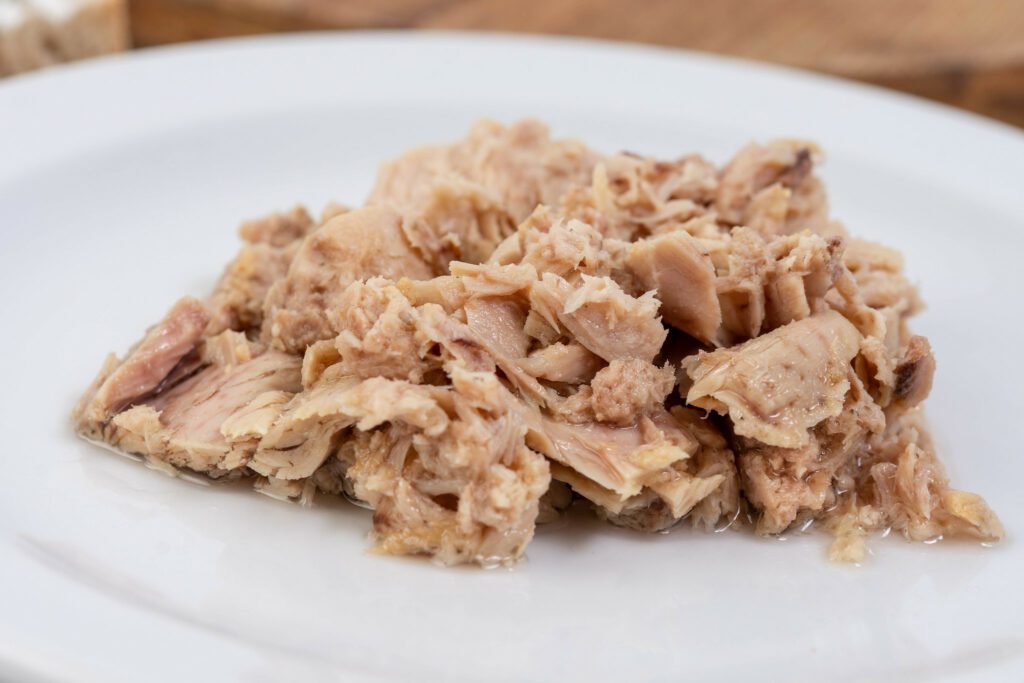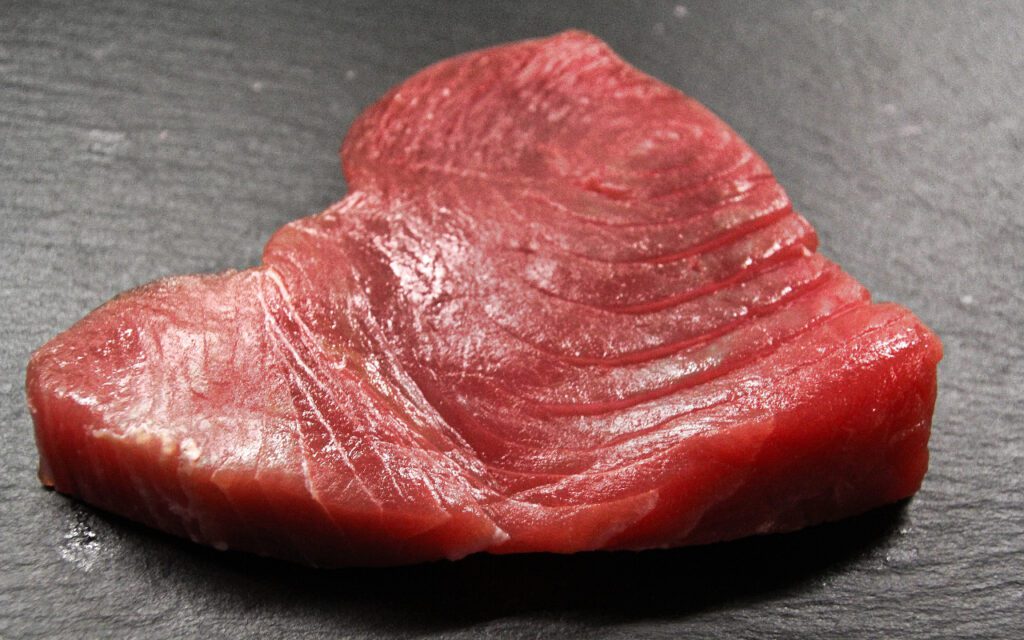As pet owners, we often want to share our favorite foods with our furry friends. One food that may come to mind is tuna.
Dogs can eat tuna in moderation, but there are some important factors to consider before adding it to their regular diet.
In this article, we’ll cover the potential benefits and risks of feeding tuna to dogs, and how to prepare it safely.
Can Dogs Eat Tuna?

Yes, dogs can eat cooked tuna and canned tuna in water with no salt.
Tuna is a common ingredient in dog food and contains many vitamins and minerals that are beneficial for your pup.
However, it’s important to note that tuna also contains high levels of mercury, which can be dangerous if consumed in large amounts.
When feeding your dog tuna, make sure you choose the version that’s packed in fresh water instead of oil or brine.
Raw tuna should also be avoided as it may contain parasites and bacteria that could be harmful to your pet.
See also: Top 10 Safe Seafood Options For Dogs To Eat
How Much Tuna Can Dogs Eat?

Dogs can typically eat up to 3 ounces of tuna per day in balanced meals. It’s important to note that the amount may vary depending on your pup’s age, size, and activity level.
Additionally, serving sizes should never exceed 10% of your dog’s total calorie intake.
When preparing tuna for your pup, ensure that it is cooked thoroughly and without any added seasoning or oil. It should also be flaked into small pieces to avoid choking hazards.
As always, it’s best to consult with your veterinarian before adding any new foods to your pup’s diet.
Can Dogs Eat Tuna
Tuna Feeding Chart According To Size
| Food | Size | Portion |
|---|---|---|
| Tuna | Toy dogs | 1 ounce per day |
| Tuna | Small dogs | 1 ounce per day |
| Tuna | Medium dogs | 2 ounces per day |
| Tuna | Large Dogs | 3 ounces per day |
Tuna Feeding Chart According To Age
| Food | Age | Portion |
|---|---|---|
| Tuna | 0 – 6 months | Don’t feed |
| Tuna | 6 – 12 months | 1 ounce per day |
| Tuna | 12 – 24 months | 2 ounces per day |
| Tuna | 24+ months | 3 ounces per day |
How Often Can Dogs Eat Tuna
Dogs can eat tuna up to several times a week in moderation. However, it should never exceed 10% of your pup’s total caloric intake for the day. It’s important to keep track of how much tuna your pup is eating and monitor for any adverse reactions.
If your pup does not have a history of allergies or sensitivities, feeding them small amounts of tuna up to several times per week is typically safe.
For pups with allergies or sensitivities, it’s best to opt for other types of protein-rich foods such as lean meats and fish. As always, you should consult with your veterinarian when making any dietary changes.
Can Dogs Eat Tuna
Health Benefits of Tuna To Dogs
- Source of healthy fats. Tuna can be a great source of healthy fats for your pup. It contains omega-3 fatty acids which can help reduce inflammation and improve skin health.
- Rich in vitamins. It can also provide essential vitamins and minerals such as selenium, phosphorus, and vitamin B12 which boost your pup’s overall immune system.
- High in protein. Additionally, tuna is high in protein which helps to increase muscle mass and strength in growing puppies.
- Rich in amino. The amino acids found in tuna can also promote healthy brain development as your pup grows.
- Aids in digestion. Lastly, tuna could be beneficial for some pups who may have difficulty digesting other types of proteins.
Potential Risks of Feeding Tuna To Dogs
- Could be high in mercury. Tuna can contain high levels of mercury which can be dangerous for puppies. Eating too much tuna can lead to mercury poisoning, so it’s important to make sure your pup is not eating too much.
- Some dogs are sensitive. Additionally, since tuna is a “fishy” food it can cause stomach issues such as vomiting and diarrhea if eaten in large quantities.
- Contains oils. It’s also important to note that canned tuna often contains other ingredients such as oil and spices that could potentially cause allergies or sensitivities in some pups.
- Could have added flavors. If you are feeding your pup tuna, make sure you are getting the right kind. Natural tuna is usually safe but avoid any canned options with added elements like sauce or flavorings.
- Might cause allergy. Lastly, always be aware of possible allergic reactions when feeding your pup any new foods including tuna.
Can Dogs Eat Tuna
Nutritional Benefits of Tuna For Dogs
| Tuna Nutrition Facts per 100 grams | % DV * |
|---|---|
| Calories | 132 |
| Total Fat | 1.3 g |
| Cholesterol | 60 mg |
| Sugar | 0 g |
| Glycemic Index | 0 |
| Sodium | 47 mg |
| Carbs | 0 g |
| Protein | 28 g |
| Vitamin D | 0% |
| Calcium | 3% |
| Iron | 8% |
| Potassium | 522 mg |
Are Dogs Sensitive To Tuna?
While tuna is considered to be a safe food for dogs, some pups may be more sensitive to it than others. If your pup has any health issues or allergies, it’s important to talk to your veterinarian before feeding them tuna.
Here are some signs of sensitivity that you should look out for:
- Unusual skin reactions such as hives, rashes, and itching
- Vomiting and/or diarrhea
- Gas or bloating
- A decrease in energy levels
- Change in appetite
If you notice any of these symptoms after feeding your pup tuna, stop feeding them the fish and contact your veterinarian as soon as possible. The vet can help determine if there’s an allergy or sensitivity at play.
How To Prepare Tuna For Dogs
- As a treat. A small amount of tuna can be used as a treat or reward for your pup. It’s important to only give them a few bites at a time and not to overfeed them.
- In kibble. You can also add cooked, canned, or freeze-dried tuna to your dog’s regular kibble as an extra source of nutrients and flavor. Keep in mind that tuna should not make up more than 10% of their diet.
- In homemade meals. You can also cook up some homemade tuna dishes for your pup. Make sure the tuna is thoroughly cooked and cut into small pieces for easy digestion before serving it to your pup.
How Fast Will Dogs Digest Tuna
The digestion rate of food in dogs varies depending on a number of factors, such as the size and age of the dog, the type of food they eat, and any existing medical conditions they may have.
On average, it takes around 8-10 hours for a dog to digest tuna, with smaller breeds often able to digest their food quicker than bigger breeds.
FAQs
Can dogs eat tuna in brine?
Yes, dogs can eat tuna in brine. In fact, fish like tuna is a great source of protein and healthy fatty acids for your furry friend. However, there are some things to consider when giving your pup tuna in brine. First, check the label to make sure that the product doesn’t contain any added ingredients like salt or garlic that could be toxic for your pet.
Can dogs eat tuna in water?
Yes, it is safe for dogs to eat tuna in water. However, you should be mindful of the brand and type of tuna that you are feeding your dog. Some brands contain too much mercury or salt, which can be harmful to your pet’s health. Make sure to provide your pup with only low-sodium, low-mercury, and non-oily tuna.
Can dogs eat tuna mayo?
Yes, dogs can eat tuna mayo in moderation. Tuna contains proteins and oils which are beneficial to a dog’s health, so it can make a tasty snack once in a while. However, you should always check the ingredients list of any store-bought tuna mayo – some brands contain added sugar or salt, which can be harmful to your pup.
Can dogs eat tuna in oil?
Yes, dogs can eat tuna in oil. However, it should always be given in moderation and as an occasional treat. Too much tuna in oil can cause digestive upset for your pup due to its high-fat content. Additionally, some brands of canned tuna have added ingredients that can be toxic to dogs like garlic or onions.
Can dogs eat tuna in sunflower oil?
Yes, dogs can safely eat tuna in sunflower oil. Sunflower oil is a great source of Vitamin E, an antioxidant that helps protect cells from damage. Additionally, it contains healthy Omega-6 fatty acids which help support a healthy coat and skin.
Can dogs eat tuna sushi?
No, it’s not recommended that you feed your dog tuna sushi. Tuna is a common ingredient in sushi, but the other ingredients and seasonings used to make it can be hazardous for dogs. Additionally, raw fish can contain parasites that can make your dog sick.
In Conclusion
Feeding your dog tuna can be beneficial when done correctly. It contains essential nutrients such as Omega-3 fatty acids and protein, which are important for a healthy diet.
However, it should be given in moderation and should not replace regular meals. Make sure to consult your veterinarian before adding any new food to your pet’s diet.
Related articles:
- Can Dogs Eat Raw or Cooked Salmon?
- Can Dogs Eat Shrimp? Shell-Yeah!
- Can Dogs Eat Cod? A Nutritious Treat For Your Pooch
- Can Dogs Eat Crab? Don’t Be Shellfish, Share Some With Your Pooch
- Can Dogs Eat Lobster? A Gourmet Treat For Your Pooch
- Can Dogs Eat Mussels? To Mussel or Not To Mussel
- Can Dogs Eat Squid? Squid-tastic Addition To Your Dog’s Diet
- Can Dogs Eat Scallops? Paws Up or Paws Down?
- Can Dogs Eat Sardines? Tiny Fish, Big Impact





Leave a Reply